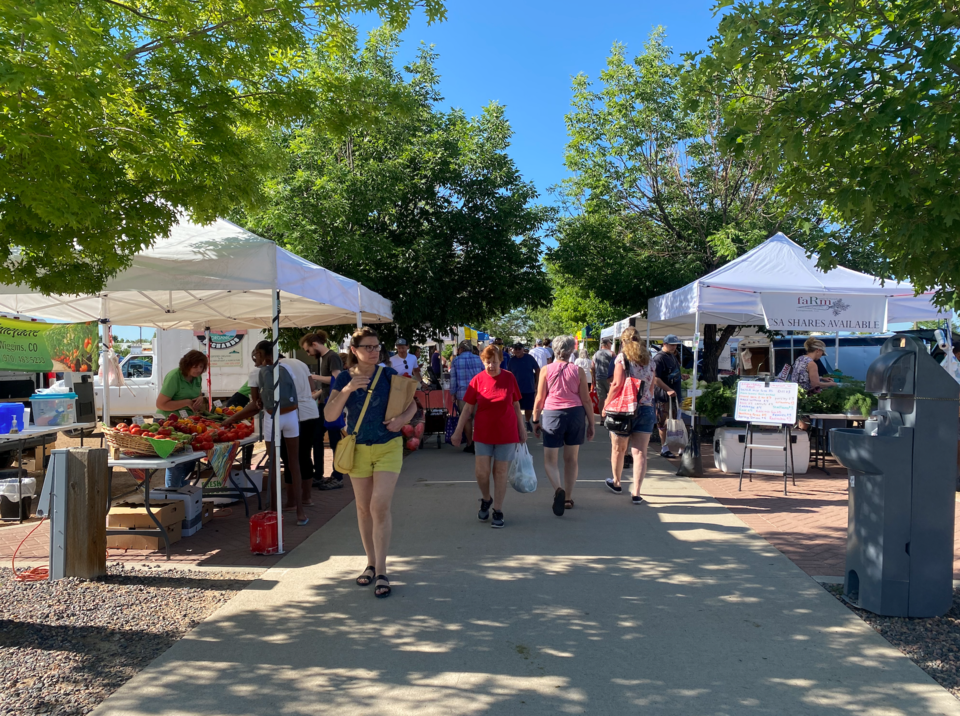The mission behind Boulder County Farmers Markets, or BCFM, sets them apart from other farmers markets ― and while it means some vendors don’t make the cut, it ultimately benefits everyone involved.
The birth of BCFM occurred in 1987 when seven farmers gathered and decided to hold a farmers market on 13th Street in Boulder. According to BCFM’s Executive Director Brian Coppom, the farmers’ vision was to sell their produce directly to the public and, by doing so, to teach people about the value of the local food system.
“Because of that founding, it really started the growers-only edict,” Coppom said. “Because it was the farmers who were growing food and bringing the food they grew (to the market). Ever since then, it’s been growers-only.”
BCFM’s growers-only philosophy means its participating vendors are only permitted to sell products that they have grown or raised themselves.
According to Chloe Johnson, a vendor for SkyPilot Farm and BCFM board member, each BCFM vendor must undergo a lengthy application process to ensure that they operate within these parameters. Additionally, Johnson said, the application assesses whether a producer practices sustainability, humane animal husbandry and regenerative agriculture. In order to be sure, the applicant process includes a site visit from BCFM staff.
“There are a lot of questions around those topics,” Johnson said. “(We’re) looking for vendors that fit these modes of production to make sure that we bring the best quality products to the market.”
At BCFM, vendors are split into two categories ― one group is producers and the other is vendors that sell prepared and packaged goods. For a producer, Johnson said, there is a hard line: if you didn’t raise it, you can’t bring it to the market.
If someone is manufacturing or processing a product that they didn’t grow themself, they fit into BCFM’s prepared and packaged category. “There’s always going to be a grey area with packaged and prepared (vendors),” Johnson said, “because they’re products that are not sourced or made locally.”
Silver Canyon Coffee has been a member of BCFM for fifteen years as a prepared and packaged vendor.
Silver Canyon Coffee’s Matt Kay sources unroasted coffee from small farms around the world and then roasts the coffee in North Boulder. At BCFM, he sells bags of roasted coffee beans as well as coffee drinks that he brews at the market.
“Because we are the roasters, we fall within the rules and regulations of the market as someone who can participate as a prepared or packaged vendor,” Kay said.
The practice of re-selling produce that a vendor did not grow themselves is a terminable offense at BCFM. According to Coppom, BCFM’s growers-only mission is in place to support the local food system, and re-selling directly undermines that goal.
“(Re-selling) is a detriment to the local growers who grow their own product and are offering field-ripened, hand-picked, carefully-selected produce which will have a much better flavor profile, much better texture and will last longer on the shelf,” Coppom said.
Moreover, the farmers who are selling their own produce are more likely to contribute to soil health and pollinator habitats, use fair labor practices and contribute to clean water resources. “All of those values that we hold dear and we know are important parts to a sustainable future,” Coppom said, “our local growers are often engaged in those practices. So when we buy from them, we not only get delicious products, but we also get all of those secondary benefits as well.”
As a non-profit organization, BCFM is arranged so that 3.5 cents of every dollar that is made at the markets goes back into funding the mission. According to Coppom, the money is spent on promoting upcoming markets, advocating for farmers and engaging the public in the conversation about the value for the local food system.
Johnson attributes BCFM’s success to being a non-profit organization.
“At the end of the day, there are no stakeholders or owners of the market who are incentivized to make as much money as possible,” she said. “I would be hard pressed to think of a more fair and balanced way to ensure the highest quality and the most honest product offerings at a market.”
BCFM works with several food access programs including Snap; Women, Infants and Children, or WIC; Double Up Food Bucks, or DUFB, and Farm to Early Childhood Education, or FTECE. Using these programs, low-income individuals and families can receive money to spend at BCFM markets.
“The food access programs have allowed us to engage a much broader spectrum of our community and that is absolutely what we want,” Coppom said. “We want to see everybody at the market and we’re always looking for new ways to make sure that people feel welcomed when they come to the market and that they really enjoy it as an experience.”



